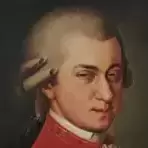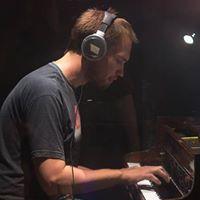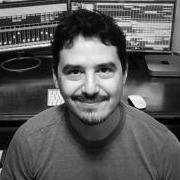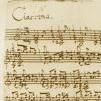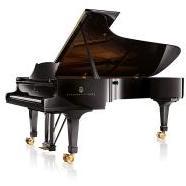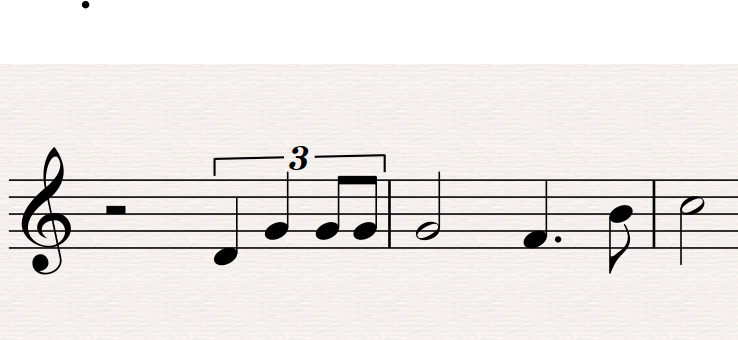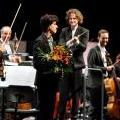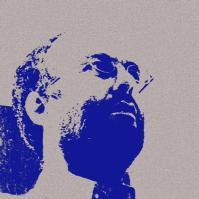Search the Community
Showing results for tags 'composing'.
-
I’d like to hear opinions about what would be the most simple and best way to write (notated) scores for pop / rock bands, classical / jazz ensembles and orchestras and create good audios "at the same time". I would like to record midi-instruments (which could be notated "automatically" when playing) and add on top of it some real instruments (guitars, bass, drums, winds, strings etc.,) which I could notate in the same session, after or before recording. I have Ableton Live 9 and Sibelius 7, but I’d prefer to work only with one program, since I’d like to edit the audio and notated score at the same time, to hear the good sounds and to see the score right away. The purpose is to create “demos” and a scores of my compositions for band members, artists and producers. I’ve heard Logic Pro might be good for this purpose? Experiences? I might not want to buy a new software right now and therefore would like to hear other suggestions as well. Any experiences with Livescore or Musescore (with Ableton)? How about Notion with Studio One? Is Garage band totally out of the picture? What’s the biggest difference between Logic and Garage band? I’ve understood they work in a similar way, so one option could be to use Garage band until upgrading to Logic. Please tell me about your experiences. This might not be the right forum for these questions, so any tips for other forums are useful as well!
- 3 replies
-
- composing
- music sequencer
- (and 6 more)
-
Hi everyone! I've been searching everywhere for a composition teacher, but without success. Any suggestions on where I can find one? I tried to find a composition teacher locally (I'm from Singapore) but sadly it seems that most of them are more interested in avant-garde modern music rather than classical music. Also, if any of you are interested in teaching composition, I would love to learn from you! I've been listening to many pieces posted here and I'm really impressed by you guys' compositional skills and creativity. Regarding myself, I am currently a secondary school student and I want to learn the classical/ early romantic style of composition. I've attempted to compose my own pieces without guidance, but they didn't turn out as I had hoped. I understand that composition is not easy to learn, but I am ready to learn from the basics. I play the piano and have some basic music theory, so learning composition won't be a completely fresh start for me. If you are interested, please feel free to leave a comment here or drop me a message! Your recommendations or willingness to mentor would mean the world to me 😉 Best regards, Saltypenguin
-
From September 30 to October 9, 2022, a MolOt seminar for young composers will be held in St. Petersburg on the basis of the Lermontov ICBS - "Open Workshops" (99 Ligovsky Ave.), tutors at 1 Lermontovsky Ave. Educational program As professors invited to the seminar: Svetlana Lavrova (1970) - Russian composer, Vice-Rector for Research and Development of the Vaganova ARB, Professor, Doctor of Art History. The second professor will be announced later. The seminar is held in two directions: "music for chamber ensemble" and "music for chamber choir". The basic groups of the seminar are the St. Petersburg MolOt-ensemble and the chamber choir "Festino". Ensemble composition: flute (also piccolo, viola); clarinet (also piccolo, bass); piano (MIDI keyboard is also possible); violin; cello The composition of the choir: 16 voices (soprano, alto, tenor, bass - 4 voices for each part). According to the results of the competitive selection, 10 active participants of the seminars will be determined (5 in the direction of "chamber ensemble", 5 in the direction of "chamber choir"), as well as 20 free listeners. It is possible to participate in the seminar as a listener: all the events of the seminar are open to the public. For nonresident participants of the seminar, the organizers of the seminar provide accommodation and meals. The road is at the expense of the participant. Active participation in the seminar involves writing a new composition for one of the collectives (the St. Petersburg MolOt-ensemble or the chamber choir "Festino" - depending on the chosen direction). The time limit for a choral composition is 5 minutes, for an ensemble composition - 8 minutes. During the seminar, active participants will have the opportunity of two individual lessons with visiting professors, as well as three rehearsals with the St. Petersburg MolOt-ensemble and the chamber choir "Festino". Also, each of the professors of the seminar will give lectures in which they will talk about important aspects of composing and introduce participants to their compositions. Within the framework of the seminar, there will be 2 master classes from the artists of the MolOt-ensemble and a master class of the choir "Festino" with an analysis of the compositions of the listeners. Composers under 35 years of age (at the time of the seminar) are invited to participate in the selection of participants of the seminar. Application for composers To participate in the selection of seminar participants, you must send the following materials by e-mail molot_ensemble@mail.ru until August 7, 2022: 1. A brief creative biography; 2. 2 photos; 3. 2 or 3 scores - instrumental works for the participants of the "chamber ensemble" direction, for the participants of the "chamber choir" direction - scores with vocal participation; 4. Recordings or links to recordings of submitted essays (desirable, but not mandatory); The list of active participants of the seminar based on the results of the competitive selection will be published on August 14, 2022. Active participants must provide the organizers of the seminar with 50% of the score of the play written for the seminar teams by September 1, 2022. The score of the play for the seminar must be provided in full by September 15, 2022. Concert program On October 2 and October 9, 2022, concerts will be held in Yaani Kirik (54A Dekabristov str.). At the opening concert of the seminar, the works of the curators and professors of the seminar will be performed. At the final concert of the seminar, the premieres of the compositions of active participants. Curators of the seminar: Yaroslav Sudzilovsky – composer, Chairman of the Guild of Young Musicians of the Russian Musical Union; Artur Zobnin – composer, violinist, artist and director of the St. Petersburg MolOt-ensemble; Alexandra Makarova – conductor, artistic director of the chamber choir "Festino". Executive Director of the seminar: Maria Andreeva is a music critic, PR manager of the St. Petersburg MolOt-ensemble. If you have any questions, please contact us by e-mail molot_ensemble@mail.ru
-
Hi, im a college student mayoring in music composition. This year Ive been attending a class about composition over poetry. The thing is this class was not very good. Most of my college mates agree that most of the time in class was wasted, and that the professor we had wasn`t very good and had no idea how to keep us engage (unlike most of our college professors). Anyways, this professor insist in the importance of keeping the stressed syllable in a strong time (first or third beat) everytime. I consider this is a very generic way of working over a text. Sometimes in music you can place a "stressed" note or chord in a weak beat, and then release the tension of that note or chord on a "strong" beat, than in this case will sound softer in comparision. 90% of Mozart`s cadences work this way. If this can be done with "instrumental" music, why can`t it be done with a piece that includes text? I have to comply to my professor demands in this regard and place every stressed syllables in strong beats in the works im presenting to him, but I doubt this rule has to be abided every single time. Id like to know the opinions of other composers who composed vocal pieces. Is my professor %100 right or is there room for this rule to be broken?
-
- 2 replies
-
- composer
- electronica
- (and 12 more)
-
Hello! I am a 17 year old music student from Belgium. I recently wrote a concerto for double bass, and it turned out really well in my opinion. Now that it's finished I actually really want to write a new piece, but I can't find any themes. I was wondering, for those who don't really those "Aha! I've got a theme!"-moments at random, how do you find/look for a new theme? Where do you get your inspiration from? And how do you know if you didn't steal it from an other work? Thanks!
-
Hi everyone! I started to research different ways of composing music and have came across the golden ratio/ Fibonacci sequence. I've watched numerous videos that explains it but they never showed me an example. May anyone show me how to compose step-by-step using the golden ratio/ Fibonacci sequence? Thank You! -Shamir
- 2 replies
-
- golden ratio
- fibonacci
-
(and 1 more)
Tagged with:
-
Hello everyone, I have listened to Piano Concerto No. 5 in E♭ major, Op. 73, by Ludwig van Beethoven and, have fallen in love with it. After listening to this I have decided to write one of my own! Listed below are the characteristics of it. Key: A♭ major Tempo: 110 bpm Time Signature: 4/4 Instruments: 2 Flutes, 2 Oboes, 2 Clarinets (in B♭), 2 Bassoons, 4 Horns (in F), 2 Trumpets (in B♭), 2 Tenor Trombones, 1 Bass Trombone, Timpani, 1 Grand Piano, Violins 1, Violins 2, Violas, Violoncellos, and Contrabasses. I have chosen these instruments based on other piano concertos that I have listened to in the past, like Tchaikovsky No. 1 and Rachmaninoff No. 2 and would like to imitate them. This is my first piece of music that is being written for full orchestra. Any and ALL tips and tricks about orchestration, writer's block, creativity, creating new themes, motifs, or writing fun and exciting and fun, new music are very well needed! Please feel free to comment below about any and everything about anything about the piece. Thank You!
- 2 replies
-
- piano concerto
- composing
-
(and 1 more)
Tagged with:
-
Note: This is a hypothetical situation: Say I was writing an orchestral piece, and I was planning to give it to my local orchestra. I know that the 1st clarinettist is brilliant, so I write an extended solo which I maybe wouldn't have done otherwise. What do you think about writing music for a specific orchestra, who will hopefully be able to play it well? When doing it, do you think about the players themselves and their standard? Or do you just compose for orchestra/ensemble without having anyone in mind?
-
There you go, that's the two bars idea I came up with. It isn't harmonized or anything on purpose, the idea is to have every individual composer make a one minute piece out of this idea the way he sees it. We can mix them all together or make a piece with a few parts based on this idea. Good luck, I'm off to compose my own version of it.
- 12 replies
-
- idea
- experimental
- (and 3 more)
-
EDIT: This survey is now closed, thanks to all who took part. I may publish the results in February, and if so, I will add a link here later. Hi folks - first post, so apologies to the mods if this type of post is not allowed! I am a composition student at the University of Surrey and I am throwing around a survey across the internet to gather some data on how musicians write music with music notation software - this forum seemed very lively, so I'm very interested in your thoughts. If you are someone that composes/arranges music with music notation software (Sibelius/Finale/MuseScore/etc.) I would be extremely grateful if you could spare 10 minutes to fill out this survey: https://freeonlinesurveys.com/s/eZTxmoaK At the end, there will be two participants chosen in a random raffle that will receive £15 via PayPal. The survey will close in 7 days (6th January 2018). If you have any questions/comments/discussion - fire away! Thank you and have a Happy New Year!
-
- composition
- composing
-
(and 5 more)
Tagged with:
-
Hi, I'm new at this forum and at writing music. Had a go on a orchestral piece about pirates. Please feel free to listen and criticize. Any input is very valuable :) Cheers!
- 5 replies
-
- 2
-

-
- orchestral
- composing
-
(and 2 more)
Tagged with:
-
Hi all, After my secondary school I want to study either Classical Saxophone or Composition. When I am chatting with Composition professors, it seems to me that they prefer composing on paper and then they notate in a notation program. I have tried it several times to compose on paper, but I find it really hard. Not because I don't know what the music will really sound like, but because I make so many notation mistakes. Actually, when writing music on paper, my scores look like Beethoven's (see picture) and I cannot even read in myself. . . My question: ''Do you compose your music first on paper and then in a notation program? Or do you directly notate in a program, such as Sibelius or MuseScore? Why?'' I think the ''Why'' is the most important part of the question. Please let me know your opinions, experiences etc. Kind regards, Maarten
-
My aim is to write songs in an acoustic ballad style (no electric guitars or drums) similar to Don Mclean's Starry Night in terms of arrangement Primarily on piano and guitar (both picking and strumming). I am looking for software to assist with: 1. Recording lyrics (entered by typing) in a way that matches up with chords and melody without much difficulty. 2. Gives the options of best chords available for a given key. (ie. you can edit individual chords in a progression easily) 3. Does auto-arranging for acoustic ballad piano or guitar style. (with the more variety being better) 4. Can generate alternative melodies or similar melodic figures that I can select from. 5. Allows a VST to be imported, so it doesn't sound like rubbish while I'm composing. From my research so far, it seems that all the software that records and displays lyrics to match chords is separate from the software that does arranging and produces nice sound. If I am wrong here, I would love to know which of the advanced arranging software is lyric friendly. EZKeys seems like the best software for my needs, but I might be wrong. EZKeys suggests the best chords, has a nice VST piano, and does auto-arranging, although the variety seems limited and I can't find any info on whether you can import or create your own arrangement midi database. (seems like you have to buy the ones they have made and they are quite expensive) EZKeys doesn't have a melody generator that I could see. Melody generation seems best done by Rapid Composer, but some have suggested that Band In A Box can also do this. From my observations of BIAB it seems they are heavily focused on the jazz, rock and electronic styles which I have no interest in. My main concern with Rapid Composer is that it will produce melodies that sound too computer-generated and weird, like what I have seen in the demos on youtube. Has anyone had good success with Rapid Composer? Synfire seems like a mystery package, but one that might be helpful as I often struggle with coming up with new rhythmic and melodic ideas. The demo on youtube makes it look pretty ordinary and would love to see the workflow of someone making something awesome with it. I'm not sure how good it would be at generating alternative melodies and arrangements that fit the modern ballad style. People suggest loading it's AI database with classical music, but I don't want my music to sound 300 years old in style! Perhaps I could only upload midis of the songs styles similar to what I want to create? Reaper seems to be the best value DAW, so I would go with that. My observations of VST acoustic guitars are that all the good ones require Kontakt 5. I especially like the workflow of Strummaker IV but it seems you need to buy Kontakt 5 which is expensive. I can't find any other VST guitars that enable you to customise strumming patterns but I might be missing something out there. So it seems I will need to buy: 1. Lyrics/songwriting software which can import/export melody and chords. 2. EZkeys OR Reaper plus a good VST guitar OR Kontakt 5 with strummaker 3. BIAB, Rapid Composer OR Synfire if I want help with melody ideas. Any suggestions would be much appreciated :)
- 1 reply
-
- software
- songwriting
-
(and 5 more)
Tagged with:
-
For many living composers, the response to this question might be something like: "Short answer, 'no' with an 'if,' long answer, 'yes' with a 'but.'" But before we start assigning labels, let's discuss what terms like "tonal" and "atonal" really mean. "Atonal music" in its narrowest usage refers to those works of composers Arnold Schoenberg (1874-1951), Anton Webern (1883-1945), and Alban Berg (1885-1935), composed in or after the second decade of the Twentieth Century, and pre-dating all three composers' adoption of the twelve-tone technique. Berg once attributed the coinage of the term "atonal" to the words of a newspaper critique, and the term itself has long since carried certain pejorative connotations. Another, somewhat broader definition, includes both these works and works of music composed using the twelve-tone technique. This technique was pioneered by Schoenberg and others in the 1920's, and was soon adopted by Webern, Berg, and later numerous composers of serious music in Europe and throughout the world of Western music composition. A third, broader still definition, includes all music in which tonal centers are sufficiently ambiguous. Under this definition, many works by Debussy, Ravel, Stravinsky, Copland, Bartók, Shostakovich, and others are sometimes described as "atonal." This third definition is perhaps the most widely used, but also the most problematic. The term is not commonly applied, for example to noise music; nor music for unpitched percussion instruments; music composed using elements of chance and aleatory techniques; experimental music; microtonal music; or other forms of musical expression falling outside the dominion of Western art music of the Twentieth and Twenty-First Centuries. Its usefulness as an aesthetic term must therefore be seriously called into question. What is "tonal music"? The term as used today broadly refers to music composed with tonal centers, or one or more focal pitches considered "stable" with regard to the others. Often this also means the use of familiar harmonic patterns, or "harmonic progressions," typical of the music of the Eighteenth and Nineteenth Centuries. The term as used today, though, perhaps only exists usefully as an antithesis to "atonal music"; as conventionally defined it does not include non-Western musics, nor Western music composed before the Mature Baroque, and its application in folk music traditions or popular styles is highly suspect. The one thing that all of these various definitions have in common is their emphasis on composer intent. "Atonal" and "tonal" do not necessarily represent meaningful expressions of listener experience, in my opinion, which I believe should be a part of any meaningful discourse about music. Instead, I advocate the adjudication of any musical expression on its own terms, in its own proper context, and with the use of descriptive terms such as "plaintive," "haunting," "lyrical," "energetic," etc. Needless to say, any discussion of music on these terms will be subjective to a greater or lesser extent; but the search for absolute, objective truths in a pursuit as rich as music will always lead to a dead end. A quote from the author George Orwell, originally written with regard to various conflicting philosophies of government in the Twentieth Century, seems uncannily appropriate if the words "tonal" and "atonal" are substituted for the terms "democracy" and "fascism": Leave a comment below and click here to continue the discussion!
- 15 replies
-
- second viennese school
- composing
-
(and 3 more)
Tagged with:
-
Hi ppl! I am looking for a composition-software. I know programms which only allow you to type in notes in a notation view but I also need a piano-roll (like the one in Fruity-Loops or Logic, Garage-Band, etc..). It is also very important that I can integrate VSTs like "The Grand 3" or "Alicia's keys" because I hate that typical bad-quality-sound which programms like "Sibelius" have. I don't need any programms like "FL Studio" or "Logic" because I never use and don't want to pay for all of the functions beside the piano roll and vst-integration. regards alex2east :)
-
- composing
- piano roll
-
(and 4 more)
Tagged with:
-
Hello I am writing a piece for 4 flutes. Each flute moves up in glissando patterns to create microcanons. I was speaking to my tutor about this the other day and he said that simply going from a low not to a high note via glissando on flute is limited because of the fingerings. My original plan was going from a low F to a high D sharp. with all the tonal and microtonal qualities in between. What is problematic about this? If I am starting from an F what is the highest note I can reach via glissando? Thanks
-
Hello everyone! I've found recently that my main problem when composing a piece is that I write small portions of it at a time, and end up having a hard time connecting the dots. For example, I might come up with an 8-bar melody as the main "theme," a development of that theme, and an ending, yet nothing in between to connect them. My question to you then is this: Have any of you experienced similar problems? How did you overcome this sort of "writer's block?"
-
As many of us know, its really tough out there for a composer. The idea of a stable job is fleeting at best, and most will have to look towards an outside line of work to supplement the lack of financial stability. But do we truly know how hard it is out there? How prepared do you feel you are to make it as a composer? The following article expands upon just how hard the prospects of making composing a form of income is. It also offers a new way of thinking that may help in some small way: http://www.newmusicbox.org/articles/Composing-a-Life-Or-How-I-Learned-to-Stop-Worrying-and-Love-the-Dollar/ Respond to the article: do you feel he over simplifies a complex issue or did you learn anything new about this topic? And what about you, How will you (or how did you) face this situation?
-
These are some things that I like to keep in mind while composing. I would like to get feedback on them. What do you think of them? Do you think they are good to keep in mind? Do you think there are problems with them? Is there something else that you think is good to think about? (I know it's long. Sorry about that.) There are three parts: big picture points, "small picture" (for lack of a better term) points, and creativity points. The big picture points have mainly to do with structure. I think of a piece like a play with act I, act 2, and act 3. The first act introduces the material which I think of as the characters. The second act "goes on an adventure." The characters do things. There are conflicts (tension) and they get resolved (released tension). The whole of act 2 has to have one general conflict that is bigger than all of the others and is introduced at the beginning of act 2 and resolved at the end of act 2. When that main conflict gets resolved, the piece goes into act 3 which is the conclusion. It should be climatic and "euphoric." It wraps up the piece by summarizing the material (all of the characters come together). It ends by leaving a sense of the entire essence of the piece in the listeners ear. We can represent the characters in the music with motifs. And we can represent their actions with melodies. The essence of the characters (the motifs) are moved by melodies (the bodies of the character). The melodies can move the motifs around in different ways to make the characters to do different things. Every character has a personality. They can share their general personality with something like a motto, or an action that tries to express their general essence. This is done with themes. A theme would be a melody that moves the motifs in a way that best bring them out. (I use motif loosely here: it can be more than just a simple melodic or rhythmic pattern, but it could be any small recognizable idea.) The introduction to the piece can best introduce the material by simply stating the themes (show off the characters' personalities to get the listener familiar with them before they go adventuring in act 2). In act 2, the characters do many different things. But just because the characters do different things doesn't make them different characters. Fundamentally they are the same character. The melodies can do all kinds of things while still containing the fundamental motifs. Act 3 is kind of like act 1. All of the characters get together and express their essence with themes. The themes pick at the listener's previous experiences with the characters in act 2 and sum them up. One thing I like to do in the ending of a piece is to find a way to harmonize all of the characters and have the melodies play on top of each other without changing them so much that it strays too far from the theme (sometimes I just compose the themes in the first place to be counterpoint-compatible with each other). It really unites them and gives that "euphoric" effect if done well. I like to imagine the structure of a piece in two dimensions: horizontally being time and vertically being counterpoint (in a generic use of the term). The three acts are ordered horizontally. A majority of the time will (probably) be spent on act 2. Vertically is all the different parts that are happening at a given time in the piece. It would be more abstract then real counterpoint, because counterpoint has to do with melodies. The different parts can be anything, whether it serves a melodic purpose, a rhythmic purpose, a texture purpose, a harmonic purpose, etc.. When these parts are layered, the listener's ear should be guided to a certain level. The parts can be anywhere on the line from being in the background to being in the foreground. The foreground is what the listener pays attention to at any given time (leads, etc.). The background still influences the listener, but is not necessarily in the conscious attention of the listener. The foreground is where the action should take place (the characters interacting and the story being told). The background is where the setting is established. That would include emotion (guided by harmonic progressions), intensity or energy level (guided by rhythm), and general feel of the setting (texture, timbre, etc.). Now, background elements aren't necessarily characters. For example, harmony doesn't exist on it's own, it is just a property that comes from the relationship of different parts playing simultaneously. So you could create harmony with simple absolute bass notes and the setting would get the emotional feel. But you can also have motifs in the background elements. This gives the setting more personality. Not all motifs have to represent foreground characters. They can represent settings as well. On the other hand, characters themselves can give personality to a setting by going into the background. If you have several melodies playing, you can phase different ones in and out of focus. The ones that aren't in focus contribute to the setting. There are three small picture points. They have to do with the content that goes into the framework provided by the big picture points. They are harmony, balance, and simplicity. Harmony is simply keeping in mind the harmony that is going on at the moment. Pretty much a no-brainer, but I like to keep it in mind. Balance has two parts: unity and diversity. You can say something is balanced when it has unity and an interesting amount of diversity. Imagine a bare white plane. This is unity without diversity. Every part of it is the same: unity. Now if we add a little dot in one corner, we have something different. Now we have a little diversity but no unity. We don't have unity because something strange has interrupted the perfect white plane. To fix it, we have to add a counter to the little dot. Perhaps, on the opposite side. This cancels out the disruption in unity, and unity is restored. That's how you get both unity and diversity and thus balance. Balance can apply in many ways on many levels. Structurally there needs to be balance. You don't want too much or too little excitement near the start or the end of the piece because it will sound out of place. This happens in the details as well. Rhythm should feel even overall (unity) but with interesting things happening in the gaps (diversity). The last one is simplicity. Don't put anything in that doesn't adequately accomplish a meaningful task. It can also mean elegance. Try to do do things efficiently. Music theory really helps with this kind of thing. That way you don't scrape your brain out trying to find the sound that has the purpose you are looking for. All of the above is an intellectual framework that lacks actual creative content. I find that to get the actual content, you have to do the opposite: not think. Creativity seems to diminish when you try to intellectualize it but seems to come out when you let it speak for itself. It's as if it's a different person than your self and you have to be quiet and let it talk. Just think about when you dream. You are asleep and not thinking. Nothing makes sense, but it is extremely creative. I often wake up and write down my dreams so that I can possibly incorporate the dream content into some kind of project of mine. The project puts an orderly framework around the creative chaos. To get the creative juices flowing, I usually listen to lots of music. Especially music that I haven't heard before, and I really pay attention to it. This puts a lot of new ideas on your mind. But because it's new and you only heard it once, you can't remember the pieces as the were. So it's hard to remember it the right way but easy to remember the wrong way. Remembering it the wrong way gives you your own creative ideas that are the result of chaotically trying to synthesize the small chunks that your brain was able to catch. All you have to do at this point is listen to the noise in your head. If you can't hear anything, then try to recall something and try to get it flowing. Once you get it flowing, you can start jotting down ideas that come to you. Once your piece gets started, and structures start appearing, the creative process becomes even easier because you aren't totally building music out of silence. You are now building it off of real music. These are the main points that I like to think about when I am composing. Comments? Thanks if you read all of this. It's long, I know. Sorry. :P
-
Or does it influence it at all? Or do you listen seriously at all?
- 11 replies
-
- listening repertoire
- composing
-
(and 1 more)
Tagged with:
-
hi guys i want to compose my first string quartet to this date i only compose for piano which is my own instrument i need some advice or anything that could help thanks
- 4 replies
-
- string quartet
- problem
-
(and 1 more)
Tagged with:

